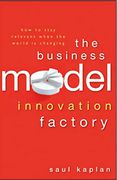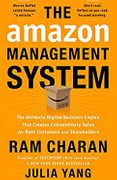
A 5 Minute Overview Of
The Business Model Innovation Factory
How to Stay Relevant When the World Is Changing
About the Author
Saul Kaplan is founder and Chief Catalyst at the Business Innovation Factory, a nonprofit which specializes in collaborative innovation in health care, education, entrepreneurship and energy independence. He previously served as executive director of the Rhode Island Economic Development Corporation and as senior strategy partner in Accenture's Health & Life-Science practice. He also worked for eight years in the Pharmaceutical Division of Eli Lilley and Company. He is a regular contributor to the Harvard Business Review, Fortune and Bloomberg Business Week. He is a graduate of the Rensselaer Polytechnic Institute and the University of Rhode Island.
The Main Idea
There are times when tweaking your business model with ongoing incremental improvements just isn't enough. Sometimes dramatically reinventing what you do is called for — and the beginning of the twenty-first-century is just one of those moments.
If anything is certain about the new millennium, it's the pace of change. New technology relentlessly hurdles into our lives. Ideas and practices travel around the world at Internet speed. Social media enables individuals to self-organize and reorganize in ways unimaginable in the twentieth century. We also live in anxious times marked by economic uncertainty, but one thing is clear: relevancy is more fleeting than ever. How to stay relevant in a changing and uncertain world is one of the most important questions of our time.
The best business opportunities of the present time and in the immediate future will belong to those who can come up with new and better business models — ways to create, deliver and then capture value. Simply put, business model innovation is the new strategic imperative and the only way to stay relevant in an ever changing world. If you want to excel in the future, learn how to innovate in the business model you use.
The challenge all leaders face is how to reinvent a business model while the entire organization is working hard pedaling the bicycle of the current one. The twenty-first century screams for transformation, not tweaks. New business model ideas come not by looking through the lens of the current business model, but by learning how to look through the lens of the customer. Transformational business models must be designed around ways to improve the customer experience, not around ways to improve the performance of the current business model. Business model innovation starts by bringing the voice and experience of the end-user into the center of an iterative design process. It's a great time to be a business model innovator. This is the innovator's day.
Sections in this Books
1. What you have always done isn't working any more. The response of most leaders when they see disruptive innovations coming is to try and make their existing business model work better. That doesn't work. At very best, all you end up doing is delaying the inevitable. Instead, you should be trying new business models all the time — and become a disruptor rather than being a victim.
2. 15 business model innovation principles. There are fifteen actionable principles involved in business model innovation. These can be organized into three main themes:

Woven together, these fifteen principles provide guidelines for developing and implementing entirely new ways to create, deliver and then capture value. They enable the kind of business model transformation which is required.
3. How to create a business model innovation factory. When it comes to business model innovation, the key operational question is always how do you go about conducting R&D for new business models? The trick is to create an in-house department which explores new business models rather than developing new products which can be commercialized by the current business model. Doing this is a challenge but well worth the effort. The way to succeed is by putting the customer in the business model driving seat.
4. Business models aren't just for business. Any organization which creates, delivers and captures value has a business model, even if it's a nonprofit. Every entity which wants to stay relevant in the years ahead needs to have a sustainable business model or else its days are numbered. And that thought extends to your personal career as well. Learn how to develop business models for all aspects of your career. Business models aren't just for businesses.
Want in-depth 30-minute summaries?
In addition to this 5-minute overview, Summaries.Com has a premium 30-minute summary of this book and 1,000+ more, to help you advance your career and business.
Check Out Summaries.com Premium Plans Today!Want more 5-minute Snapshots?
To get a new 5-minute business book snapshot each week, sign up for the Summaries.com free plan.
Sign Up for the Summaries.com Free PlanDigital Business Management 101 Collection
If you enjoyed this summary, here is a collection of related business book summaries, to help you get ideas and strategies that will give you an edge over your competition.
This course talks about some of the best management ideas and practices that have emerged in the digital era.
Buy Digital Business Management 101 Collection (5 x 30-Min Summaries)
The Business Model Innovation Factory
How to Stay Relevant When the World Is Changing
by Saul Kaplan

The Amazon Management System
The Ultimate Digital Business Engine That Creates Extraordinary Value for Both Customers and Shareholders
by Ram Charan and Julia Yang

The Digital Transformation Handbook
Rethink Your Business For the Digital Age
by David Rogers

The Future of Management
by Gary Hamel

Management Challenges for the 21st Century
The Central Management Issues of Tomorrow
by Peter F. Drucker